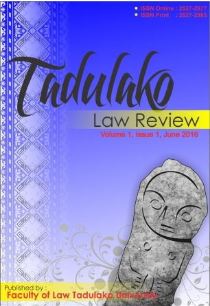ARRANGEMENT OF JUDICIAL POWER IN INDONESIA THROUGH THE IMPLEMENTATION OF ONE-STOP JUDICIAL REVIEW AT THE CONSTITUTIONAL COURT
Keywords:
One Stop Judicial Review, Legal Reform, Rearrangement Judicial PowerAbstract
As it is known that the Constitutional Court (MK) has the authority to examine laws against the 1945 Constitution of the Republic of Indonesia, while the Supreme Court (MA) has the authority to examine regulations under laws against laws. The problems will arise if the review of statutory regulations against the law is taking place in the Supreme Court, while the law that is the touchstone is also being tested in the Constitutional Court and declared contrary to the 1945 Constitution of the Republic of Indonesia. So that, regarding on this issue, an idea emerged to carry out legal reforms related to the authority to conduct judicial reviews, namely by centralizing the authority of judicial review in the Constitutional Court or what is called a one-stop judicial review. The purpose of this research is to analyze the institutional model of judicial power in other countries in dealing with judicial review cases. In addition, the purpose is to analyze the legal reasoning for the application of one-stop judicial review in the Constitutional Court. As well as analyzing the design of a one-stop judicial review arrangement in the Constitutional Court. The method used is normative legal research using statutory, conceptual, and comparative approaches. The results of the study show that the consistency of the implementation of a judiciary is an important issue to achieve tiered norm justice. Norm disputes will not be a problem in judicial practice, both at the MK and MA institutions. However, it is different if the legal norms given by the court's decision contradict each other. So that it becomes a necessity to organize the judicial power in Indonesia through the one-stop judicial review authority in the Constitutional Court.
References
Al-Fatih, S. (2018) ‘Model Pengujian Peraturan Perundang-Undangan Satu Atap melalui Mahkamah Konstitusi’, Jurnal Legality, 25(2), pp. 247–260. Available at: https://ejournal.umm.ac.id/index.php/legality/article/view/6005.
Asshiddiqie, J. (2015) Kedudukan Mahkamah Konstitusi dalam Struktur Ketatanegaraan Indonesia, Mahkamah Konstitusi RI. Available at: https://www.mkri.id/index.php?page=web.Berita&id=11779 (Accessed: 1 May 2023).
Asshiddiqie, J. and Syahrizal, A. (2012) Peradilan Konstitusi di Sepuluh Negara. Jakarta: Sinar Grafika.
Audha, E.M. (2021) ‘Purifikasi Judicial Review dalam Sistem Ketatanegaraan Indonesia’, Jurnal Legislasi Indonesia, 18(2), pp. 168–183. Available at: https://doi.org/10.54629/jli.v18i2.693.
Basic Law 1949 (Konstitusi Federal Jerman) (no date).
Finck, D.E. (1997) ‘Judicial Review: The United States Supreme Court Versus the German Constitutional Court’, Boston College International and Comparative Law Review, 20(1), pp. 123–157. Available at: https://heinonline.org/HOL/LandingPage?handle=hein.journals/bcic20&div=10&id=&page=.
Hajri, W.A. and Rahdiansyah (2018) ‘Pengujian Peraturan Perundang-Undangan di Indonesia: Persoalan dan Jalan Keluarnya’, UIR Law Review, 2(1), pp. 235–243. Available at: https://doi.org/10.25299/uirlrev.2018.2.01.1436.
Huda, N. (2012) Hukum Tata Negara Indonesia, Edisi Revisi. Jakarta: Rajawali Press.
Huda, N. and Nazriyah, R. (2011) Teori dan Pengujian Peraturan Perundang-undangan. Bandung: Nusamedia.
Kepaniteraan Mahkamah Agung RI (2021) Panitera MA: Semester Pertama Tahun 2021, Kinerja Memutus Perkara Lampaui Target, Mahkamah Agung RI. Available at: https://kepaniteraan.mahkamahagung.go.id/registry-news/1810-panitera-ma-semester-pertama-tahun-2021-kinerja-memutus-perkara-lampaui-target#:~:text=Menurut laporan tersebut%2C jumlah beban,tahun 2020 sebanyak 199 perkara (Accessed: 1 May 2023).
Kommers, D.P. (2019) ‘German Constitutionalism: A Prolegomenon’, German Law Journal, 20(4), pp. 534–556. Available at: https://doi.org/10.1017/glj.2019.46.
MD, M.M. (2010) Perdebatan Hukum Tata Negara Pascaamandemen Konstitusi. Jakarta: Rajawali Press.
Munawaroh, N. and Hidayati, M.N. (2015) ‘Integrasi Pengujian Peraturan Perundang-Undangan di Mahkamah Konstitusi sebagai Upaya Pembangunan Hukum Indonesia’, Jurnal Hukum IUS QUIA IUSTUM, 22(2), pp. 255–268. Available at: https://doi.org/10.20885/iustum.vol22.iss2.art5.
Permatasari, E. (2021) Bedanya Judicial Review dengan Hak Uji Materiil, Hukum Online. Available at: https://www.hukumonline.com/klinik/a/bedanya-ijudicial-review-i-dengan-hak-uji-materiil-cl4257 (Accessed: 2 May 2023).
Putra, A. (2018) ‘Dualisme Pengujian Peraturan Perundang-Undangan’, Jurnal Legislasi Indonesia, 15(2), pp. 69–79. Available at: https://doi.org/10.54629/jli.v15i2.172.
Soemantri, S. (1997) Hak Uji Materiil di Indonesia. Bandung: Penerbit Alumni.
Syahuri, T. (2014) Pengkajian Konstitusi Tentang Problematika Pengujian Peraturan Perundang-Undangan. Jakarta: Badan Pembinaan Hukum Nasional Kementerian Hukum dan HAM RI.






